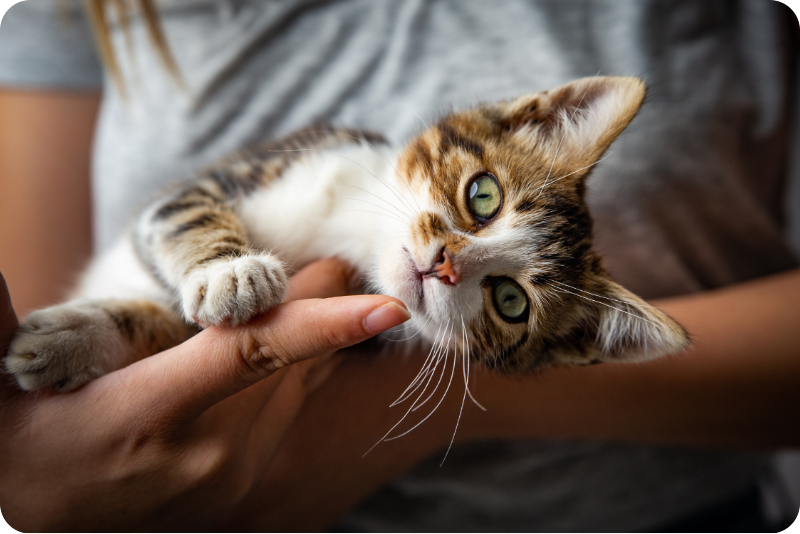It’s exciting to contemplate welcoming a cat into your family for the first time, whether this will be a kitten or an older cat. Cats can be fabulous family pets, but even though they have an independent nature, they need some specific care to keep them healthy and thriving. In this article, we share some expert pet care advice that every new cat owner needs to know.
Essential healthcare
There are some healthcare essentials that every new cat owner needs to take care of. One of the first points of call will be to register your new feline friend with a veterinary practice. Many cat owners will choose their most local vet practice to minimise travelling time for their new pet, but other factors to consider include the opening hours and emergencyarrangements, the pricing and range of services offered, and the approach of the vet team. Some practices may offer separate waiting areas and consulting rooms or other facilitiesdesigned to meet the unique needs of cats. Whether the veterinary practice is part of a group, or independently owned, it’s important that you know your pet will be in good hands.
Establishing a relationship with a vet practice will help you set off on your new cat-owningjourney with confidence. The practice team will be able to guide you about the routine healthcare that will help your cat to stay healthy and happy. This will include an annual health check and vaccinations to prevent infectious diseases, routine dental care, and flea and worming treatments. Your will also need to make sure your cat is neutered and microchipped.
Your veterinary practice may offer a pet health plan to cover regular preventive care to keep your cat thriving, and which spreads the cost into monthly payments to help with yourbudgeting. You should also consider taking out pet insurance offering financial protection to cover the costs of unexpected veterinary care in case of accidents, injuries or illnesses. Different types of pet insurance are available so it is important to check that the policy you are considering meets your needs. Your vet team will be able to discuss the generalconsiderations, or you can find further information on choosing insurance for your cat in this guide from Cats’ Protection https://www.cats.org.uk/help-and-advice/getting-a-cat/pet-insurance.
A cat in the family
Cats are renowned for being independent and adaptable – and it’s true, they enjoy more autonomy than many other pets – but that doesn’t mean they’re not also sociable, affectionate and capable of building a deep bond with their owners.
If you’re a new cat owner, you may be surprised at the strength of the attachments your cat forms with all members of the family. And cats are also great at adapting their behaviour and routines to match their owners’, so that they’re awake and active at the times when you’re around, or when their dinner is ready!
Cats have their own unique personalities, and spending time with your kitty will help you get to know their character, preferences and feline foibles. Kittens and younger cats enjoy a lot of active playtime, but older cats also benefit from play, especially with interactive toys orpuzzle feeders.
Some cats are keen to be stroked and have a cuddle with their human family members, while others are more reserved. How much they enjoy petting may be influenced by their past experiences, but will also depend on how you approach them. Allowing cats to decide when they want to interact with you, and taking care not to surprise them by touching them when they’re asleep or hiding can help them to build trust and feel confident in you.
Places cats are most likely to enjoy being stroked:
– Cheeks
– Chin
– Top of head
– Neck and shoulders
Places cats are least likely to enjoy being stroked:
– Belly
– Legs and paws
– Tail
– Eyes, nose, mouth and ears
New cat owner basics – what will I need?
Whether you are bringing home a new kitten, or adopting an older cat, there are a few things you’ll need to have ready to help them settle in and get to know their new family.
Bedding
Cats appreciate a cozy spot for a snooze, and will often take advantage of sofas, chairs or a sunny windowsill, but it’s important that cats have a comfortable space of their own to sleep in – a soft, padded and easy to wash cat bed is ideal. Many cats prefer their beds to be in a quiet and private spot where they won’t be disturbed and may also like to be higher up, where they can see what’s going on from a secure space – just make sure it is safe for them to access.
Litter tray
All cats need to be able to toilet somewhere they feel safe. Provide a choice of at least twolitter trays in two different quiet spots, well away from their food and water bowls. If you have more than one cat, a good rule of thumb is to have one more litter tray than you do cats– so two cats will need three litter trays, three cats will need four litter trays, and so on.
Make sure litter trays are always kept clean – cats are fastidious animals and often won’t use a dirty litter tray! The easiest way to do this is to choose a clumping cat litter and scoop out the box daily to remove anything that’s been left in there.
If your cat will have outdoor access, consider fitting a cat flap so that they don’t have to rely on you to open the door for them. Some cat flaps work with your cat’s microchip, preventing other cats from invading your home and your cat’s territory. Check your cat flap can also be locked for times when you want to keep your cat inside.
Toys and activities
Keeping your cat active is important for their health and wellbeing, especially if they have limited access to the outdoors. Providing toys that allow your cat to engage in their natural behaviours of stalking, chasing and pouncing, such as a fishing rod toy or a catnip mouse, not only helps them exercise, but helps them feel good and strengthens the bond between you.
Cats are intelligent and need mental stimulation, so a treat ball, which they can chase around the house to shake out treats, keeps them busy and gives them the chance to satisfy their hunting instincts too.
Feeding
Cats are carnivores and to get all the nutrients they need to thrive, should be fed a high-quality diet formulated specifically for cats. There are plenty of cat foods to choose from, but it’s important that you provide a diet that matches your cat’s age and needs. Tailored cat foods are available for kittens, adult cats and seniors, which can help meet their needs at each stage of life. Some cats will benefit from “therapeutic” diets to help address their medicalneeds – your vet can advise you on whether your cat would benefit from this.
Make sure your cat always has fresh water available. Some cats prefer to drink from moving water, so consider a water fountain in these cases. If you have more than one cat, or you also have dogs in your household, make sure that each animal has a food and water bowl of its own in a separate location, plus an extra one for each species. This reduces competition at feeding time and helps all your furry family members to feel secure.
As you embark on the exciting journey as a new cat owner, we can offer plenty of advice and support at your local Kin Vet Community practice. If you have any questions about your new feline friend or you would like to register them at one of our veterinary practices, get in touch with us here: https://www.vetprofessionals.kinvet.co.uk/contact-us/
Find a Vet Practice Near You
Our Latest News and Advice

Join our Pet Healthcare Plan, the Kin Care Club.
Our comprehensive pet healthcare plan is designed to help you give your cat or dog the best care, while keeping your budget in mind.
Whether you’re looking for essential coverage or complete peace of mind, the Kin Care Club offers two flexible plans tailored to your needs and your pet’s well-being.



